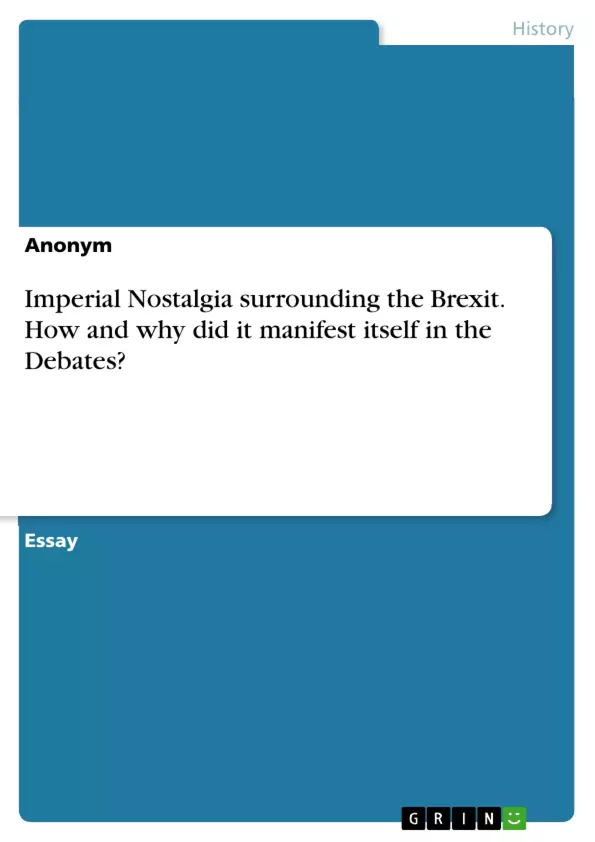The main aim of this study is to show linkages of imperial ideologies in society in the context of Brexit and to list examples of the use of imperial nostalgia in the debate. In the following, the paper first looks at an attempted definition of imperial nostalgia and tries to establish connections to Brexit. Second, the paper looks at the nostalgic heirs of the empire and their origins and briefly discusses the UK’s "world power complex". Third, it takes a closer look at how society deals with the imperial past. Lastly, the text looks at rhetoric and visual symbols of imperial nostalgia in the referendum debate.
Inhaltsverzeichnis (Table of Contents)
- How and Why Did Imperial Nostalgia Manifest Itself in the Debates Surrounding the United Kingdom’s 2016 Referendum on European Union Membership?
- Defining Imperial Nostalgia and Connecting it to Brexit
- The Nostalgic Heirs of the Empire: Origins and the UK’s ‘World Power Complex’
- How Society Deals with the Imperial Past
- Rhetoric and Visual Symbols of Imperial Nostalgia in the Referendum Debate
Zielsetzung und Themenschwerpunkte (Objectives and Key Themes)
This paper examines how and why imperial nostalgia manifested itself in the debates surrounding the United Kingdom's 2016 referendum on EU membership. It aims to show linkages of imperial ideologies in society in the context of Brexit and to list examples of the use of imperial nostalgia in the debate.
- Defining and understanding imperial nostalgia in the context of Brexit
- Exploring the role of British imperial history and national identity in shaping Brexit sentiment
- Analyzing the rhetoric and visual symbols used to promote a nostalgic vision of Britain's past
- Investigating the connection between imperial nostalgia and the desire for British “global” power
- Examining the complex relationship between imperial nostalgia and contemporary British political discourse.
Zusammenfassung der Kapitel (Chapter Summaries)
- This chapter defines the term "imperial nostalgia" and explores its connection to the Brexit debate. It examines the concept of nostalgia, its different theoretical types, and its manifestation in political discourse.
- This chapter delves into the historical context of the British Empire and its impact on British national identity. It examines the legacies of imperialism and the ongoing desire for a “world power complex” in the UK.
- This chapter explores how British society grapples with its imperial past and its relationship to the present. It examines the ways in which imperial nostalgia is used in rhetoric and visual symbols to shape public opinion and political discourse.
Schlüsselwörter (Keywords)
The main keywords and focus topics of this paper include imperial nostalgia, Brexit, British national identity, historical memory, global power, political rhetoric, visual symbolism, and the legacy of the British Empire.
Frequently Asked Questions
What is "imperial nostalgia" in the context of Brexit?
It refers to the use of British imperial history and ideologies to shape public sentiment and national identity during the 2016 EU referendum debates.
How did imperial nostalgia manifest in the Brexit debate?
It appeared through specific political rhetoric and visual symbols that promoted a nostalgic vision of Britain as a global power independent of the EU.
What is the "world power complex" mentioned in the study?
It describes the ongoing desire within parts of UK society and politics to maintain a status of global influence based on its historical imperial legacy.
Does the paper analyze visual symbols?
Yes, the study takes a close look at both the rhetoric and the visual iconography used during the referendum to evoke imperial sentiments.
How does British society deal with its imperial past?
The paper examines the complex relationship society has with its history and how these memories are utilized in contemporary political discourse.
- Citar trabajo
- Anonym (Autor), 2023, Imperial Nostalgia surrounding the Brexit. How and why did it manifest itself in the Debates?, Múnich, GRIN Verlag, https://www.grin.com/document/1359352



